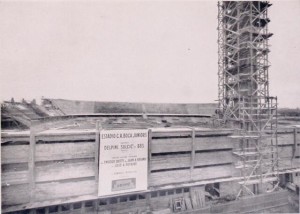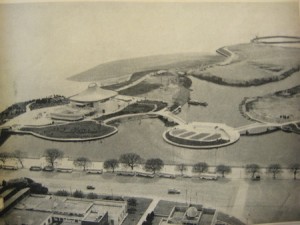 The Football Scholars Forum, the online think tank based at Michigan State University, recently explored fascinating aspects of the long and complex relationship between fútbol and politics in the history of Buenos Aires, Argentina.
The Football Scholars Forum, the online think tank based at Michigan State University, recently explored fascinating aspects of the long and complex relationship between fútbol and politics in the history of Buenos Aires, Argentina.
In its second session of the 2015-16 season, FSF co-founder Alex Galarza, PhD candidate in History at Michigan State, shared a chapter from his dissertation: “Dreaming of Sports City: Consumption, Urban Transformation, and Soccer Clubs in Buenos Aires.” Galarza’s doctoral research has been funded by prestigious national and international grants, including the coveted Fulbright and FIFA Havelange scholarships.
The potential impact of Galarza’s dissertation work beyond the ivory tower of academia can be gleaned from his involvement in an ongoing documentary film project. Working with four young Argentine journalists, Galarza aims to use the format of filmmaking to reveal the “hidden” history of Boca Juniors’ Ciudad Deportiva—a (failed) urban renaissance construction project that sheds new light on the role of professional soccer clubs in city planning and everyday life. (Watch the trailer here.)
The Forum encouraged Galarza to explain how this history of Buenos Aires compares with the experiences of other Latin American cities, and broader processes of modernization and state formation. The author and participants also discussed constructions of race, whiteness, and gender through fútbol, the politics of club governance, and the ideological projects behind stadium construction.
Listen to or download the audio recording here.
Tag: Ciudad Deportiva
Boca Júniors’ “Fraud of the Century”
On October 3-4, Alex Galarza spoke at the Rethinking Sports in the Americas conference at Emory University about the history of Club Atlético Boca Júniors’ Ciudad Deportiva (“sports city”), a gargantuan urban project hailed in the 1960s as a harbinger of national progress and modernization that later became known as the “fraud of the century.” Galarza is a doctoral student in history at Michigan State University and co-founder of the Football Scholars Forum. This paper is part of ongoing doctoral research funded by the Fulbright Program and a FIFA Havelange Scholarship.
The scholarly gathering in Atlanta provided ten early career scholars and graduate students with a chance to present new research papers and receive feedback from peers and senior scholars. Participants read and commented on pre-circulated papers, which made for lively and engaging discussions. Chris Brown, an Emory History PhD student studying sport in the Brazilian Amazon, organized the conference with support from Dr. Jeff Lesser of the Emory History Department and Dr. Raanan Rein, Vice President of Tel Aviv University. Several Football Scholars Forum members shared their work and ideas, including keynote speaker, Brenda Elsey, as well as Rwany Sibaja and Ingrid Bolívar.
The video of Alex Galarza’s presentation on the Ciudad Deportiva reveals the intertwining of sport, politics, and society in postwar Buenos Aires. The Ciudad was profoundly shaped by the idea that popular consumption of fútbol and leisure were integral components of citizenship and national progress. This helps explain why Argentina’s national government and Buenos Aires’ municipal authorities subsidized the project and integrated it into the city’s master plan. The general public, not just Boca supporters, invested an impressive amount of money and faith into the undertaking. While the initial success of the Ciudad speaks to the changing ways in which porteños viewed modernity and consumed leisure, the project’s monumental failure in the long run sheds new light on the nature of political and economic change in Argentina after Perón.
 Alex Galarza, a PhD student in history at Michigan State University and co-founder of the Football Scholars Forum, has been awarded the João Havelange Research Scholarship. This prestigious award is administered jointly by FIFA and CIES (Centre International d’Etude du Sport), an independent research center created in 1995 by the governing body in collaboration with the University of Neuchâtel, and the City and State of Neuchatel, Switzerland.
Alex Galarza, a PhD student in history at Michigan State University and co-founder of the Football Scholars Forum, has been awarded the João Havelange Research Scholarship. This prestigious award is administered jointly by FIFA and CIES (Centre International d’Etude du Sport), an independent research center created in 1995 by the governing body in collaboration with the University of Neuchâtel, and the City and State of Neuchatel, Switzerland.
Galarza’s project is titled “Between Civic Association and Mass Consumption: The Soccer Clubs of Buenos Aires.” It explores how clubs developed as both centers of mass spectacle and sites of everyday urban sociability. Club members and officials used political connections to secure city space and public subsidies for stadiums and the overall success of their professional teams. While clubs became centers of patronage and spectacle, they were also non-profit civic associations central to social and cultural activities in the city. Clubs provided educational facilities, libraries, leisure space, and political forums for their members.
Galarza’s research examines the tensions within football clubs during the mid-twentieth century, an era when Argentine society entered a period of deep economic and political changes following the ouster of Juan Domingo Perón in 1955. Perón’s project aimed at developing a new kind of citizen and civic culture in which the popular classes would have a greater political voice and heightened access to new forms of mass consumption. Mass political participation and consumption remained critical and unresolved tensions during the democratic and military governments that followed. One powerful example of how soccer clubs gave shape and meaning to civic engagement, popular spectacle, and mass consumption is Boca Juniors’ Ciudad Deportiva (in photo above). This failed project was a mix between a stadium complex and amusement park, built over seven artificial islands on sixty hectares of land filled in the Rio de la Plata.
Click here to read a digital version of Galarza’s preliminary work on the fascinating history of the Ciudad Deportiva.
Check back with us for an interview with Galarza in the coming days.